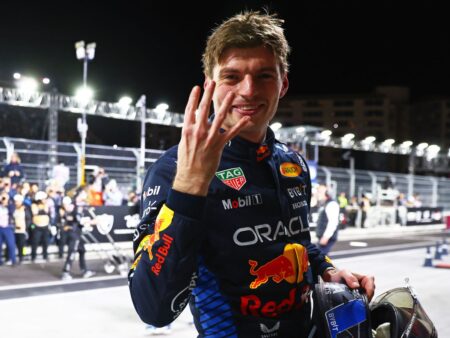In a move that sent ripples of surprise across the fiercely competitive world of Formula 1, Christian Horner, Red Bull Racing`s longest-serving and most successful team principal, was suddenly dismissed from his role with immediate effect. After two decades at the helm, steering the team from its inception to multiple world championships, his abrupt departure left a void and, more significantly, a multitude of unanswered questions.
The official statement from Red Bull on Wednesday offered no specific reason for the 51-year-old`s exit, stating only his departure. For a figure so intrinsically linked to the team`s identity and success, the lack of transparency fueled immediate speculation and analysis across the paddock and beyond. Horner himself, according to reports, was given no explicit reason for the decision.
With Laurent Mekies swiftly appointed as his successor, promoted from his position leading the junior Racing Bulls squad, attention quickly turned to identifying the underlying factors behind this seismic shift. While the immediate shock subsides, a closer look at the events of the past 18 months reveals a complex web of potential pressures and internal dynamics that may have contributed to the end of Horner`s tenure.
A Possible Shift in On-Track Fortunes?
Red Bull`s 2023 season was a display of near-total dominance, securing Max Verstappen`s third drivers` title and the constructors` championship with an unprecedented 21 wins out of 22 races. The start of 2024 saw this dominance continue, with four victories from the first five races. However, the latter half of 2024 witnessed a significant challenge, as McLaren and Ferrari demonstrably closed the gap, even surpassing Red Bull in performance at several key junctures.
While Verstappen managed to clinch his fourth consecutive title largely due to his early season points buffer, the growing performance deficit to McLaren, approaching 300 points by mid-season, was a stark contrast to the previous year. While Red Bull under Horner has navigated periods without outright dominance before, such a sudden drop in relative performance within a stable regulatory cycle is certainly unusual and would undoubtedly be a point of concern for the company hierarchy. However, given the team`s recent championship successes under his leadership, performance alone seems an insufficient explanation for such a drastic, immediate change.
The Persistent Second Driver Conundrum
Adding to the complexities on track has been the long-standing issue of Red Bull`s second driver seat. The struggles to find a consistent, competitive partner for Max Verstappen have been a recurring narrative, casting a shadow that perhaps reflects on the team`s car design philosophy or driver management strategy.
The situation became particularly notable with the decision regarding Sergio Perez, who was reportedly compensated after being dropped at the end of the previous season, mere months after his contract extension. Further confusion arose at the start of the current year with the swift demotion of Liam Lawson back to Racing Bulls after only two races, following a decision to initially promote him over the more experienced Yuki Tsunoda. Tsunoda`s subsequent performance, often trailing his Racing Bulls teammates, didn`t alleviate the pressure. This consistent churn and apparent difficulty in settling the second seat, whether attributed to driver selection or a car potentially tailored too specifically for Verstappen`s unique style, doesn`t paint the most stable picture for the team`s leadership.
Internal Power Dynamics and the Verstappen Factor
The death of Red Bull co-founder Dietrich Mateschitz in October 2022 undeniably altered the landscape at the top of the Red Bull empire. A power struggle within the company`s ownership structure emerged, with different factions vying for influence over various global operations, including the successful F1 team. Christian Horner, for a period, appeared to have strong backing from Chalerm Yoovidhya, who holds the majority stake.
However, support from Mark Mateschitz, Dietrich`s son and owner of a significant minority stake, alongside increased oversight from Red Bull`s head of sport, Oliver Mintzlaff (responsible for communicating the sacking), suggested a shifting balance. Paddock rumour suggests the “Austrian side” of the business gained ascendancy. Compounding this intricate political environment was the increasingly prominent role of Max Verstappen and his management team, led by his father Jos Verstappen and manager Raymond Vermeulen.
Jos Verstappen had publicly voiced criticism of Horner following a separate controversy earlier in 2024, creating undeniable friction. While Max himself maintained a seemingly solid working relationship with Horner, his unwavering loyalty to his father was equally apparent. Amidst recent “conversations” confirmed by Mercedes boss Toto Wolff regarding Verstappen`s future, speculation arose that the Verstappen camp, leveraging the driver`s indispensable status, might have influenced the owners to effect a change at the top, potentially as a condition for securing the reigning champion`s long-term commitment beyond his 2028 contract which is rumoured to contain exit clauses. This theory suggests a high-stakes manoeuvre within the ownership struggle, where the driver`s future became intertwined with the team principal`s fate.
The Shadow of Allegations and Key Departures
A significant blow to Horner`s standing and authority within Red Bull stemmed from allegations of inappropriate behaviour made by a female colleague in February 2024. Despite being cleared following an internal investigation and an appeal against that decision being dismissed, the controversy generated immense media scrutiny and internal tension. This period notably coincided with the public fallout between Horner and Jos Verstappen.
While Horner initially retained his position, reportedly due to backing from parts of the ownership, the episode seems to have eroded some of that crucial support over time. Sources suggest that Chalerm Yoovidhya`s previously steadfast support eventually diminished. Furthermore, the scandal unfolded around a period of significant, high-profile departures from the technical and sporting leadership of the team.
The exit of legendary design guru Adrian Newey was arguably the most impactful. His relationship with Horner had reportedly deteriorated, with the atmosphere surrounding the allegations cited as a contributing factor in Newey`s decision to leave, eventually joining Aston Martin. Preceding Newey`s departure were Chief Designer Rob Marshall, who moved to McLaren (coincidentally, the team currently challenging Red Bull most strongly), and Sporting Director Jonathan Wheatley, who joined Sauber (soon to become Audi). While some staff turnover is normal in F1, the loss of three such key, long-serving figures in relatively quick succession, set against a backdrop of internal turmoil and dipping performance, likely added to the pressure on Horner`s position.
Uncertainty Regarding the 2026 Engine Project?
Looking ahead, the upcoming 2026 regulations, particularly the significant changes to the power unit formula, represent a massive undertaking for Red Bull. For the first time, the team is developing and building its own engine through Red Bull Powertrains. Competing with established manufacturers like Mercedes and Ferrari in this complex domain is a formidable challenge.
Paddock whispers have suggested that Red Bull`s engine project might not be progressing as smoothly as hoped, while rivals like Mercedes are rumoured to be making strong headway. While these remain unconfirmed rumours, any significant concerns about the 2026 power unit`s competitiveness would be a major strategic worry for the company. If Red Bull`s leadership received unfavourable reports on the progress of their bespoke engine, it could potentially have influenced their assessment of the team`s long-term prospects and the leadership required to navigate the next era. A change at the top, however disruptive, might be perceived by some as necessary to address future challenges, even if based on internal assessments not visible externally.
A Cumulation of Pressures
Ultimately, Christian Horner`s removal from Red Bull appears to be less about one single catastrophic failure and more about the cumulative effect of multiple, intertwined pressures. A shifting power base within the ownership, strained relationships exacerbated by past controversies, the leverage wielded by the team`s star driver and his influential advisors, challenges in maintaining absolute on-track dominance, difficulty in managing the second driver seat, and potentially, concerns about the team`s future technical direction all seem to have converged. The initial backing Horner enjoyed reportedly waned, leaving him exposed in a complex internal environment.
While Red Bull`s official statement offered no clarity, the abrupt end to Christian Horner`s 20-year tenure reflects a behind-the-scenes drama far more intricate than a simple performance review. The true, complete reasons may only emerge gradually, or perhaps, never fully. For now, the F1 world is left dissecting a departure that marks the end of an era and ushers in a period of uncertainty for the dominant force of recent years.











